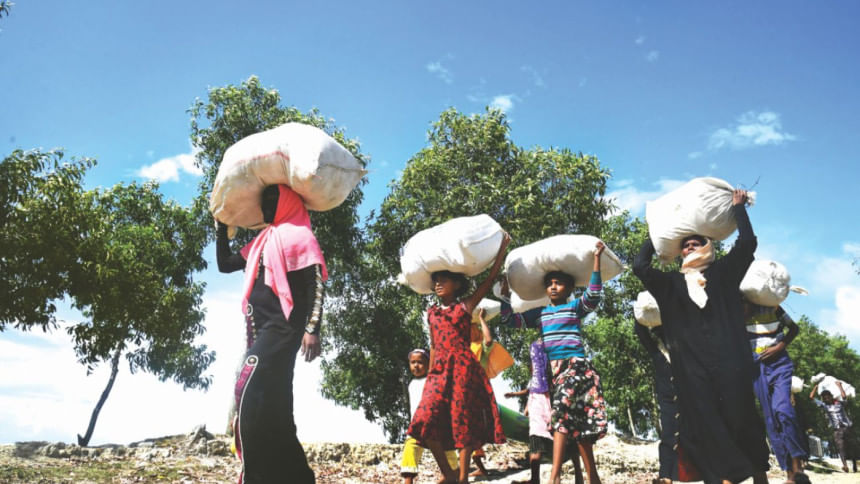200,000 more to arrive in coming weeks

The International Rescue Committee fears around two lakh more Rohingyas will flee to Bangladesh in coming weeks, exacerbating an already "unimaginable humanitarian crisis" in Cox's Bazar that already hosts over eight lakh refugees.
"The IRC expects a further 200,000 new arrivals in coming weeks -- bringing the total refugee population to over 1 million," the New York-based humanitarian organisation, which operates in Myanmar's Rakhine State, said in a statement on Saturday.
The figure is based on knowledge of the remaining population of Rohingyas in Rakhine State as the pre-crisis number is estimated to be approximately 1.1 million, said IRC spokesperson Chiara Trincia.
“It's currently estimated that 2-4k people a day are crossing and it is likely that this will continue steadily over the next two months, with occasional peaks (as many as 20k in one day),” Trincia told The Daily Star in a WhatsApp message last night.
“Assuming this continues with peaks and surges, by end of year we will have at least 200k extra arrivals, adding further demand on already strained resources.”
The Rohingyas continue to flee Rakhine despite the world leaders' call to stop violence, allow access to aid agencies and ensure their security.
The UN Security Council has issued a statement condemning the atrocities, but taken no concrete action against Myanmar because of opposition from veto power China though the UN termed the military campaign "textbook example of ethnic cleansing".
Amid worldwide criticism, Myanmar's de facto leader Aung San Suu Kyi had earlier said there was no conflict in Rakhine since September 5.
Yet, the persecuted minority group continues to flee from the Myanmarese state.
The new arrivals say they had no sense of security there as they saw their homes or those of neighbours burning, men killed and women raped. They also spoke of severe food and cash crisis.
Hundreds of Rohingyas were feared killed in Myanmar army's clearance operations that began in response to insurgent attacks on August 25, forcing over 613,000 Rohingyas to stream into Bangladesh.
There were shortages of life-saving supplies in Rakhine as Myanmar had blocked all UN aid agencies from delivering vital supplies of food, water and medicine to thousands of civilians after the military campaign began.
Late October, Myanmar agreed to allow the World Food Programme to distribute food there, but it is not known how far it could reach to the people in distress.
The Red Cross, which has been operating in Rakhine, says it is often difficult to reach the people who stayed back in Myanmar.
“The nature of the terrain is very difficult, you have mountains, rivers, wetlands, and people are scattered,” said Fabrizzio Carboni, head of delegation of the Red Cross in Myanmar.
When they go to these remote villages, the first thing they do is listen to people's problems, Carboni told Beijing-based CGTN television channel on Saturday.
“I mean, there is this isolation of community, this psychological impact of the violence.”
The Red Cross says its humanitarian aid is essential now, but adds that its help is not a long-term solution.
“It's not just a humanitarian responsibility, this is a political responsibility for the people to go back to their normal life,” Carboni said.
“There is obviously a need to reconcile communities to create a political environment which allows people to go back to their normal life,” he added.
SHOCKING LEVEL OF MALNUTRITION
A recent survey conducted by humanitarian agencies in Cox's Bazar has revealed shocking levels of malnutrition amongst Rohingya children.
It is further deepening fears of an impending and very serious public health crisis awaiting the world's most vulnerable group of refugees, according to International Rescue Committee (IRC).
The severe acute malnutrition rate of children is 7.5 percent, nearly four times the international emergency level.
"This means that a quarter of Rohingya children between six months and five years of age -- almost 40,000 -- are already malnourished and in urgent need of life-saving help," the IRC said in a statement, fearing the malnutrition rates to be higher with the aid agencies struggling to provide adequate food and other services.
Nearly three-quarters of the Rohingya people in Cox's Bazar lack enough food as well as sanitary living conditions, while 95 percent of them drink water contaminated with faecal matters.
“The conditions we are seeing in Cox's Bazar create a perfect storm for a public health crisis on an unimaginable scale,” said Cat Mahony, IRC's emergency response director in Cox's Bazar.
“The situation will only deteriorate with more arrivals and a greater strain on already overstretched resources.”

 For all latest news, follow The Daily Star's Google News channel.
For all latest news, follow The Daily Star's Google News channel. 








Comments